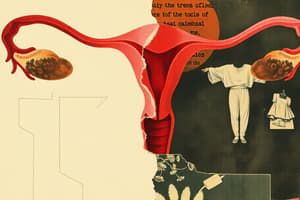Podcast
Questions and Answers
Which of these factors can disrupt the menstrual cycle?
Which of these factors can disrupt the menstrual cycle?
- Stress
- Excessive exercise
- Changes in weight
- All of the above (correct)
Hormonal imbalances can cause irregularities in the menstrual cycle.
Hormonal imbalances can cause irregularities in the menstrual cycle.
True (A)
What is one reason why understanding the menstrual cycle is crucial for effective family planning?
What is one reason why understanding the menstrual cycle is crucial for effective family planning?
Predicting ovulation.
Understanding the menstrual cycle is important for assessing a woman's ______ and for helping with pregnancy planning.
Understanding the menstrual cycle is important for assessing a woman's ______ and for helping with pregnancy planning.
Match each factor with its potential impact on the menstrual cycle.
Match each factor with its potential impact on the menstrual cycle.
Which of the following hormones is primarily responsible for thickening the uterine lining in preparation for a potential pregnancy?
Which of the following hormones is primarily responsible for thickening the uterine lining in preparation for a potential pregnancy?
The menstrual cycle is a constant process that occurs throughout a woman's life.
The menstrual cycle is a constant process that occurs throughout a woman's life.
What is the name of the phase in the menstrual cycle where a mature egg is released from the ovary?
What is the name of the phase in the menstrual cycle where a mature egg is released from the ovary?
The ______ is the shedding of the uterine lining that occurs during menstruation.
The ______ is the shedding of the uterine lining that occurs during menstruation.
Which of the following is NOT a key hormone regulating the menstrual cycle?
Which of the following is NOT a key hormone regulating the menstrual cycle?
The length of the menstrual cycle is identical for all women.
The length of the menstrual cycle is identical for all women.
Match the following phases of the menstrual cycle with their primary characteristics:
Match the following phases of the menstrual cycle with their primary characteristics:
What happens to the corpus luteum if fertilization does not occur?
What happens to the corpus luteum if fertilization does not occur?
Flashcards
Factors Affecting Menstrual Cycle
Factors Affecting Menstrual Cycle
Elements that disrupt menstrual regularity include stress, illness, and weight changes.
Hormonal Imbalances
Hormonal Imbalances
Disruptions in hormone levels that lead to irregular menstrual cycles.
Menstrual Cycle Significance
Menstrual Cycle Significance
Understanding the cycle is key for family planning and fertility assessments.
Irregular Menstrual Cycle Indicators
Irregular Menstrual Cycle Indicators
Signup and view all the flashcards
Obstetric Nursing and Menstrual Cycle
Obstetric Nursing and Menstrual Cycle
Signup and view all the flashcards
Menstrual Cycle
Menstrual Cycle
Signup and view all the flashcards
Menstruation Phase
Menstruation Phase
Signup and view all the flashcards
Follicular Phase
Follicular Phase
Signup and view all the flashcards
Ovulation
Ovulation
Signup and view all the flashcards
Luteal Phase
Luteal Phase
Signup and view all the flashcards
Estrogen
Estrogen
Signup and view all the flashcards
Progesterone
Progesterone
Signup and view all the flashcards
FSH and LH
FSH and LH
Signup and view all the flashcards
Study Notes
Menstrual Cycle Overview
- The menstrual cycle is a complex series of physiological changes in a woman's body that prepares the uterus for potential pregnancy each month.
- It's a cyclical process that typically lasts 21 to 35 days, though this varies considerably between individuals.
- The cycle is regulated by hormones, primarily estrogen and progesterone, produced by the ovaries.
Phases of the Menstrual Cycle
-
Menstruation (Days 1-5): Characterized by the shedding of the uterine lining (endometrium). Blood and tissue are expelled from the vagina. Hormone levels are at their lowest. This is the first phase of a new cycle.
-
Follicular Phase (Days 6-13): This phase prepares the ovaries for ovulation. Follicles in the ovaries develop, and estrogen levels rise. The uterine lining begins to thicken in preparation for a possible fertilized egg. The body is preparing for ovulation.
-
Ovulation (Day 14): The dominant follicle in the ovary releases a mature egg (ovum). This usually occurs around day 14 of a 28-day cycle, but this can vary widely. LH surge is a critical trigger for ovulation.
-
Luteal Phase (Days 15-28): After ovulation, the follicle transforms into the corpus luteum. The corpus luteum produces progesterone, which further thickens the uterine lining to potentially receive a fertilized egg. If fertilization does not occur, the corpus luteum degenerates, estrogen and progesterone levels decrease, and menstruation begins.
Hormonal Regulation
- Estrogen: Plays a crucial role in follicle maturation, uterine lining thickening, and development of secondary sexual characteristics.
- Progesterone: Essential for maintaining the thickened uterine lining, preparing it for implantation of a fertilized egg, and supporting a pregnancy if achieved.
- Follicle-stimulating hormone (FSH) & Luteinizing hormone (LH): These hormones regulate the development of ovarian follicles and trigger ovulation.
- These hormones are closely regulated, with varying levels throughout the cycle. Feedback mechanisms control these hormonal fluctuations.
Key Events Related to Pregnancy
- If fertilization occurs, the fertilized egg implants in the uterine lining. Progesterone levels remain elevated to support the pregnancy.
- If fertilization does not occur, the corpus luteum degenerates, progesterone levels decrease, and the uterine lining is shed during menstruation.
Factors Affecting the Menstrual Cycle
- Stress, illness, excessive exercise, changes in weight, and other health conditions can disrupt the menstrual cycle.
- Hormonal imbalances can cause irregularities.
- Medications and some medical conditions can directly affect the menstrual cycle regularity.
Significance in Obstetrics
- Understanding the menstrual cycle is crucial for effective family planning.
- Knowledge of the menstrual cycle is essential for predicting ovulation and assessing fertility.
- Irregularities in the cycle can indicate potential underlying health issues requiring investigation.
- In obstetric nursing, a thorough understanding is necessary for patient assessment, counseling, and education.
- Knowing the menstrual cycle helps in determining the stage of a woman's reproductive health and assisting in any pregnancy planning the women might have.
Studying That Suits You
Use AI to generate personalized quizzes and flashcards to suit your learning preferences.



